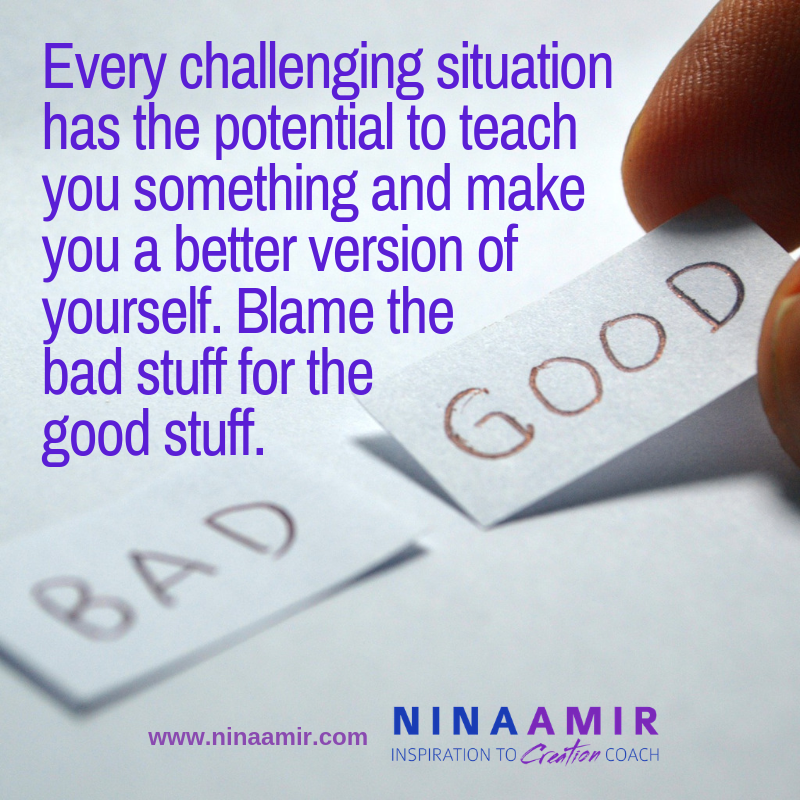 I blame others—more often than I care to admit. For example, I blame my fear of people leaving on my father, who died when I was seven. I blame my feelings of inadequacy as a writer on my mother, who told me I couldn’t earn a living as a novelist.
I blame others—more often than I care to admit. For example, I blame my fear of people leaving on my father, who died when I was seven. I blame my feelings of inadequacy as a writer on my mother, who told me I couldn’t earn a living as a novelist.
But if I can blame others for the bad things in my life, I also have to credit them for the good stuff that came out of those challenging experiences. It’s my father’s fault that I have such a strong sense of commitment and rarely leave a relationship (even when I’d be better off doing so). It’s my mother’s fault that I turned to nonfiction writing, and became a magazine journalist, blogger, and author.
[Tweet “If we can blame others for bad times, we must also blame them for the good ones.”]
Blame Hard Times for the Good Stuff
Tony Robbins says, if we can blame others for bad times, we must also blame them for the good ones. After all, every situation, no matter how tough, provides a lesson. If we are willing to explore what it can teach us, the challenge or struggle offers a way to grow and change for the better.
Robbins, for instance, talks about being beaten by his mother when he was a child. This caused him great suffering. Because of that experience, he has dedicated his life to lessening the suffering of others.
In other words, it’s possible to find some type of good outcome from even the most challenging life experiences.
How to See the Good
To stop blaming others for the bad and, instead, blame them for the good, you have to be willing to look for a different type of result. For example, instead of Robbins seeing himself as a victim because his mom beat him, he sees himself as someone with the ability to alleviate suffering in others. Instead of seeing myself as a failed novelist, I see myself as someone who can make a positive and meaningful difference with my words—someone who can help other writers also achieve impact with their work.
Stop blaming others for the past. Instead, take responsibility for your response to what happened. Choose a positive response.
[Tweet “It’s possible to find some type of good outcome from even the most challenging life experiences.”]
Respond Rather than React
It’s human to react, rather than respond—at least initially—when something unpleasant or painful happens. Besides blame, you may react with anger, judgment, hostility, or victimhood. Some of these reactions allow you to feel more powerful since bad experiences often create a sense of powerlessness.
However, if, instead of reacting, you choose a response to what has happened, you step into your power. You take responsibility for yourself and how you move forward.
You can be angry at your spouse for cheating on you, for instance. You can resent him, say you’ll never trust another man, and blame him for your new feeling of being unworthy of love.
Or…you can decide that this painful situation has helped you gain clarity. You now see that you were in the wrong relationship. And you can determine that honesty and trustworthiness are values you will seek in another relationship, and you can affirm that you are worthy not only of love but of a faithful man.
And then you can blame your ex for the fact that you found and married the perfect man and are happier than you ever were in your first marriage.
You can blame your boss for firing you. Or you can realize that you were unhappy in the job and blame him for allowing you to land a better position.
You can blame your dad for abandoning you or blame him for the fact that his absence helped you become resourceful and responsible.
You have a choice. You have the power to take responsibility for how you respond to any situation in life. And that includes how you see the circumstances of your life and what meaning you give them.
[Tweet “Stop blaming others for the past.”]
Learn from Life
Choose to learn from each experience. Finding meaning in the worst things that happen to you. As you do, you take back your personal power and stop blaming others for the bad stuff. You can then start blaming them for the good stuff.
You’ve probably heard it said that all of life is a lesson. If you can believe that, you’ll stop blaming God or The Universe for doing things “to you.” Instead, you’ll see that every aspect of life is doing things for you.
There’s a conspiracy to help you step into your very best self. And sometimes, to do that requires that you experience difficult circumstances. But you come out of it stronger, more resilient, and better in a variety of ways.
How can you blame anyone or anything for that?
Do you blame the tough times for the good stuff? Tell me in a comment, below. And if you found this post useful, please, share it on social media and with a few friends.
Never miss one of my videos! Click here to subscribe to my YouTube channel.
 Do you struggle to see the good that has come out of your life experiences? Give me an hour of your time, and I’ll help you see how to move toward fulfilling your potential and purpose. Apply for a FREE Certified High Performance Coaching strategy session. Fill out this application.
Do you struggle to see the good that has come out of your life experiences? Give me an hour of your time, and I’ll help you see how to move toward fulfilling your potential and purpose. Apply for a FREE Certified High Performance Coaching strategy session. Fill out this application.
Or register for my Certified High Performance Group Coaching program here. It’s a great option if you don’t feel ready for one-on-one coaching and want to enjoy the power of group learning.


My dearest friends, Tamara and Andrew Overlee, the founders of Joy of Healing, taught me to look at challenges as opportunities to learn and grow while developing our character. At the height of my painful, chronic, debilitating fibromyalgia I had difficulty looking beyond the pain and all that was going wrong in my life. So grateful to have received that I so desperately needed! Thank you for your article reminding us all to learn and grow from challenging situations!
You are very welcome! And thank you for your lovely comment.